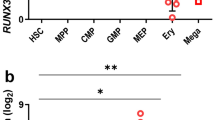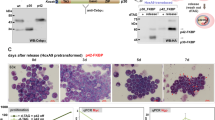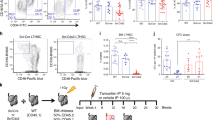Abstract
The myeloid zinc finger gene, MZF-1, is a hematopoietic transcription factor expressed in developing myeloid cells. To characterize further the role of MZF-1 in myelopoiesis, we used retroviral gene transduction to overexpress MZF-1 in HL-60 cells to produce HL-60-MZF-1 cells. HL-60 cells respond to retinoic acid (RA) with growth inhibition, granulocytic differentiation and apoptosis. However, HL-60-MZF-1 cells exposed to RA continue to proliferate in response to RA as evidenced by a higher percentage of cells in S phase, higher peak cell counts, and later peak cell counts. Morphologic differentiation of the RA-induced HL-60-MZF-1 cells is delayed with half as many of the HL-60-MZF-1 cells compared to the wild-type HL-60 cells that are differentiated after 3 days of RA, although both cells types responded with 80–95% mature granulocytes after 6 days of RA. Apoptosis was delayed in the MZF-1 transduced cells as measured by internucleosomal DNA fragmentation patterns, the terminal transferase end labeling reaction (TUNEL), and quantitation of fragmented DNA by the diphenylamine reaction. Several markers of differentiation were identical in both HL-60 and HL-60-MZF-1 cells including CD11b, CD33, CD34, CD13, CD16 and CD14. However, following 6 days of RA, only half as many HL-60-MZF-1 cells expressed CD18 compared to the wild-type HL-60 cells. Expression of the bcl-2 proto-oncogene transcript and protein was higher in the HL-60-MZF-1 cells compared to wild-type HL-60s and expression persisted for 5 days following RA in the HL-60-MZF-1 cells compared to only 3 days in the parental HL-60 cells suggesting that bcl-2 may contribute to the inhibition of apoptosis. Overexpression of MZF-1 had no effect on PMA-induced monocyte/macrophage differentiation of HL-60 cells. Together these findings indicate that MZF-1 can stimulate cell proliferation and delay RA-induced differentiation and apoptosis in HL-60 cells. MZF-1 may function in a similar role in myelopoiesis allowing myeloid precursors to expand their numbers before going on to terminally differentiate.
This is a preview of subscription content, access via your institution
Access options
Subscribe to this journal
Receive 12 print issues and online access
$259.00 per year
only $21.58 per issue
Buy this article
- Purchase on Springer Link
- Instant access to full article PDF
Prices may be subject to local taxes which are calculated during checkout
Similar content being viewed by others
Author information
Authors and Affiliations
Rights and permissions
About this article
Cite this article
Robertson, K., Hill, D., Kelley, M. et al. The myeloid zinc finger gene (MZF-1) delays retinoic acid-induced apoptosis and differentiation in myeloid leukemia cells. Leukemia 12, 690–698 (1998). https://doi.org/10.1038/sj.leu.2401005
Received:
Accepted:
Published:
Issue Date:
DOI: https://doi.org/10.1038/sj.leu.2401005
Keywords
This article is cited by
-
Cooperation of Dnmt3a R878H with Nras G12D promotes leukemogenesis in knock-in mice: a pilot study
BMC Cancer (2019)
-
The transcription factors Ik-1 and MZF1 downregulate IGF-IR expression in NPM-ALK+ T-cell lymphoma
Molecular Cancer (2015)
-
A conceptual framework for the identification of candidate drugs and drug targets in acute promyelocytic leukemia
Leukemia (2010)
-
Regulation of granulopoiesis by transcription factors and cytokine signals
Leukemia (2000)



